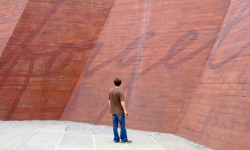
Throughout Scripture we see God’s call to those who follow him to care for ‘the least of these’, to overthrow oppression, to beat swords into ploughshares, to fellowship with those on the outside of society, and to speak for those who cannot. Bonnie Robinson looks at the part that church and other leaders play in overcoming barriers to social justice.
The arc of the moral universe is long, but it bends towards justice. — Martin Luther King Jr1
In the 1960s my father, a young Presbyterian minister studying in the USA, travelled south to a small church to hear Martin Luther King Jr preach. As Rev Dr King stood to speak, rocks started pounding on the roof; outside the church, people opposed to civil rights were trying to drown him out. But he preached on, and my father said, even if you could not hear every word, you knew the gospel was being spoken. The Rev Dr King continued to preach and outside they ran out of rocks.
When I look at great Christian leaders through history it seems that justice is at the heart of leadership, because justice is at the heart of the gospel. God listens to the cry of the oppressed (Exodus 22:22) and responds in righteousness and in justice, in steadfast love and in mercy (Hosea 2:19).
So there’s no getting out of it. People who love God are called to justice, and leaders are called to support others in this task. As leaders, then, be it in church, caring services, employment, or our own communities, how do we enact this core part of our faith? How do we lead with social justice?
A vision for social justice
Social justice can be a daunting prospect, maybe best left to professionals, those interested in politics, or government. Yet at its heart, justice is about relationships, between people and with God. Justice rights wrong relationships and builds an environment, structures and systems that enable right relationships to flourish.
As leaders, our role is to build these right relationships and to work overcoming barriers that get in the way of these, at every level: personal, community, societal and even worldwide.
Having this vision and understanding of social justice makes a difference to how we lead. At HBH Senior Living where I work, a few years ago we changed the wording of our organisational statements to include the words “meeting the needs of vulnerable older people, through the compassion, love and justice of Jesus Christ”. This led us to ask, who amongst older people is vulnerable right now, and what is our role in meeting their needs? We realised that one of the most vulnerable groups of older people were those who needed low‑cost rental housing. We knew from research that, statistically, not owning a mortgage‑free home by retirement makes you more likely to live in poverty and to struggle to meet health and well‑being needs. We also knew this group was growing.
Wearing our social justice lens, as an organisation we committed to making a difference. For some time we were not sure how we would actually do this. Then last year, a small social housing village was put up for sale. Knowing that in this part of Auckland if it was sold to a developer it would be lost forever, HBH stepped out in faith and purchased it, totally debt-funded. Long term we plan to develop the site and provide even more housing.
Without our vision of justice for vulnerable older people, would we have taken this step? Maybe. But leading with a vision for social justice made it very clear—we were called to do this. As leaders of this organisation, my team and the board have all learnt through this experience. We have knowledge we didn’t have before, and we are developing new skills to manage this new part of our service. Social justice grows you. Which is how it should be because, as leaders, one of our tasks is to support people and organisations to grow.
A decision-making framework
In my years of leading social service organisations, I have found a simple framework that helps me as a leader to think through decisions from a social justice perspective and to grow my ability to build right relationships. This is the See - Judge - Act framework.2
See: observe the world around you.
- What is happening to people? (Find out; go outside your normal information sources.)
- What is this doing to people?
- Why is this happening?
Judge: what you see in the light of gospel values, the values of your church, community or organisation.
- What does Scripture say about what is happening to people?
- What does the experience of the church and the community say?
- What do you think should be happening?
Act: to make right relationships, between people, communities, and nations.
- What exactly do you want to change—what is your long‑term goal?
- What actions can you take now—your short-term goal?
- Who can you involve? Who can help?
Working through these steps helps us to see more clearly the issues that need leadership.
The leader’s task
As leaders working through social justice, we will often plant seeds and never see the plant grow to maturity. Leadership is about being in for the long haul, which may be generational. One of my all-time leadership heroes, William Wilberforce, who helped bring about the end of slavery in Great Britain, worked tirelessly for 40 years, never knowing whether he would live to see this mission completed. He knew that his task as a leader was to plant such a strong vision of God’s justice around slavery that it would be continued by many others until God’s work was done.
As leaders everything we do is partial. We create a vision, set a plan and grow support, but we never on our own complete anything. Leadership is always collective. What is important is to accept the challenge of our part. As Mother Teresa is often attributed as saying:
I alone cannot change the world, but I can cast a stone across the waters to create many ripples.
In responding to God’s great call for justice, what ripples will your leadership make?
Story: Bonnie Robinson
Bonnie is the CEO of HBH Senior Living (previously called Howick Baptist Healthcare), a Baptist organisation providing a range of housing, community and residential care services for older people in Auckland. She is currently studying towards a Doctorate of Professional Practice focusing on the place of social justice in leadership decision-making.
Footnotes:
- This quote was used by Martin Luther King Jr but seems to originate with Theodore Parker, a 19th century Unitarian minister who called for the abolition of slavery.
- There are many versions of this framework. This version is based on one from The Poverty and Justice Bible, Bible Society New Zealand, 2015 (Insert page 8).
Scripture: Unless otherwise specified Scripture quotations are from New Revised Standard Version Bible, copyright © 1989 National Council of the Churches of Christ in the United States of America. Used by permission. All rights reserved.


